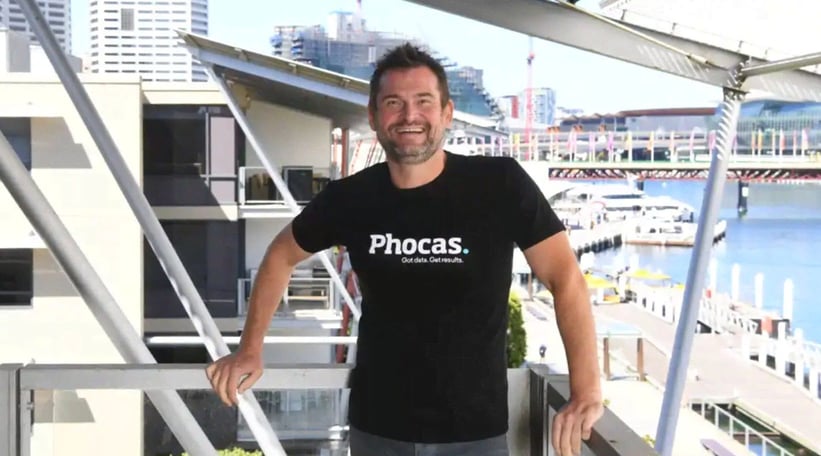Phocas keen to grow after capital raisings
Business intelligence software company Phocas is almost two decades old, profitable and quickly approaching $50 million in revenue, but it believes a cash injection from OneVentures will help it more than double its revenue in the next three years.
The company has its sights set on hitting $100 million in revenue within three years and has raised $3 million from the venture capital firm's credit financing arm, in addition to an earlier $7 million equity raising in 2018.
Founded in 2001 by Aussie entrepreneur Myles Glashier and English businessman Paul Magee, it provides cloud-based subscription data analytics software for manufacturers, distributors and retailers that gives them insights into how to run their businesses.
Originally founded in the UK, the company is now headquartered in Australia with offices in Sydney and Melbourne, and its development teams are based in the regional NSW centre of Orange.
Bootstrapped until June 2018, the company generated $43 million in revenue last year and has been profitable since its early days.
Mr Glashier said the $3 million in credit financing ensured the company could continue to pursue growth opportunities, but did not further dilute its equity while it was considering a larger equity round.
‘‘Until recently we didn't take any money, we've always been in control, and we could have continued with that, but we feel there is such a massive opportunity in existing markets, new geographies and to invest more in our products,'' he said.
‘‘We have a really strong balance sheet, with 90 per cent recurring revenue and a 97 per cent retention rate, we have a solid reliable income with plenty of cash.
"We're in a strong position to go along as we are, but there seems to be a lot of dry powder out there to invest and we could take opportunities to expand the business a lot faster."
The company has been growing at 25 per cent to 30 per cent each year.
Phocas competes against tech giant Microsoft's Power BI, as well as Tableau and DOMO, and counts as customers businesses such as Hairhouse Warehouse, Gazman, Repco and Bupa Optical. All up, it has about 1800 customers, largely in the mid-market.
"Since our investment in Phocas, we have seen the value of the company increase more than fivefold. Phocas is a company to watch into the future," OneVentures managing partner Michelle Deaker said.
It wasn't until 2011-12 that the company shifted its headquarters to Australia and set up shop in Orange, after bringing on tech entrepreneur Phil Dodds, who also owned a sheep farm near the regional town.
Mr Glashier said he would recommend other companies consider establishing themselves in regional centres, so long as they were near a university.
"From the beginning it was fantastic. There was already a small group of people Phil knew and a lot of talent from the Department of Primary Industries,'' he said.
‘‘In Sydney there hasn't been a net increase in people coming into tech. People just move from one company to another. While it can be harder to attract people to Orange, it's rare that we lose staff."
The company has 170 employees spread across Australia, New Zealand, the US and UK.
This article has been reproduced from the Australian Financial Review, written by Yolanda Redrup on March 16, 2020.
To learn more about Phocas business intelligence request a data consultation with one of our experts.

Yolanda is an experienced technology and business journalist with the Australian Financial Review at Fairfax Media.
Related blog posts

Phocas has upgraded the system we use to manage customer support. We’ve moved from Jira to Pylon, a support platform designed for B2B software companies like Phocas and the customers we work with.
Read more
As a leading Business Intelligence and Financial Planning & Analysis (BI and FP&A) platform for the middle-market we are to excited to share Accel-KKR, a technology-focused investment firm has made a majority equity investment in the company. Terms of the transaction are not disclosed.
Read more
Manufacturers, distributors and retailers rely heavily on their suppliers to deliver quality products on time and at the right price. Strong supplier relationship management (SRM) is essential for these industries because it enables you and your suppliers to map out the supply chain, achieve economies of scale and offer customers an extensive choice of products.
Read more
DIFOT (Delivered In-Full, On-Time) or OTIF (On-Time In-Full) is a fundamental KPI when analyzing the performance of your supply chain. The main goal is to get your customers the products they need, when they need them, in the quantity they ordered. DIFOT measures how successful your business is at achieving this objective and identifies procurement problems and supplier reliability.
Read moreBrowse by category

Find out how our platform gives you the visibility you need to get more done.
Get your demo today